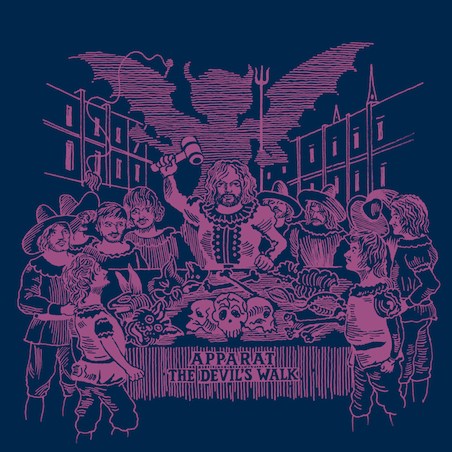Sascha Ring (aka Apparat), celebrated for his mastery of machines, evolves into a bonafide songwriter/musician with one of the (if not the) most melancholic albums of 2011. Sonicscapes full of abyss, glimmer, and lethargy – if you’re a happy-go-lucky sort of a person, you’ll probably hate Apparat’s fourth album for reminding you how depressing life can be. But if misery truly loves company, it will be in love with The Devil’s Walk.
It’s been four years since Apparat’s third LP; 2007’s acclaimed Walls struck a right balance between Ring’s finesse for electronica and his growing longing for acoustics. Yet who knew he would come up with an album that led some reviewers to compare Apparat to Coldplay. Err – isn’t comparing almost any musical act to Coldplay like saying you’re too lazy to do the research? Yes, this album has grandiose tendencies but certainly not in the tradition of stadium pop rock. Even Radiohead would’ve been a better comparison. It seems the lanky German has more in common with Sweden’s experimental folk outfit, Fredrik, who has moved on to more electronic territory with their third album, Flora, or a fellow studio geek like Memory Tapes. Both embrace that certain inescapable sadness, experimenting with organic sounds while having control of the machine-made sounds. Though Ring’s vocal delivery is much more convincing and more inviting than Dayve Hawk’s slightly acidic vocals.
In an interview, Ring has stated that 80% of The Devil’s Walk is machine-made, but it’s the 20% organics that has twice the impact. From the opener “Sweet Unrest” with accumulative instruments chiming in – layers upon layers – chorus hums, twinkling guitars, vibrating glockenspiel – building up to a crescendo – Ring sets the tone for something grand and conceptual. Guitar, piano, and cello weave and tremble in the bed of mechanized manipulation. Each instrument has its own identity, for example the crying piano contrasted against the restless cello on “Ash Black Veil.” The very baroque “Escape” evokes the rich orchestration employed by Owen Pallett on Heartland. On the most prominent candidates for singles, “Song of Los” and “Black Water,” Ring’s lamentation becomes so weary that you feel at any moment he will burst into a million pieces. The Berlin musician who fell in love with Mexico – but even the colorful, tropical, and festive country could not conquer Ring’s depression.
The two most organic tracks on The Devil’s Walk employ minimal layers and synths. On an album full of gloom, “Goodbye” is surely the doom, conjuring a medieval dark ages – like the last fainting words of a prisoner in a dungeon, awaiting his or her execution. Sung by Anja Plascho (aka Soap & Skin), the whispery vocals wane in inescapable sorrow. The final track, “Your House Is My World,” reveals a different shade of Ring’s vocal abilities – more comforting than in despair, delivered as a euro-folk lullaby piece that quivers and drifts in the gloomy windy night.
A meticulously-crafted electro baroque pop album, The Devil’s Walk strives to be grand but is best left for solitary listening. None of the 10 tracks feel out of place, yet the concept album it strived to be from its opener doesn’t quite coalesce. The songs are united in tone by Ring’s melancholy, not by a musical arc. The conflict between majestic and intimate seems to be counterintuitive at times, and becomes overwhelming for those who don’t know what depression is. But if your nature is forlorn, this sentimental and cryptic album will be your best friend.

